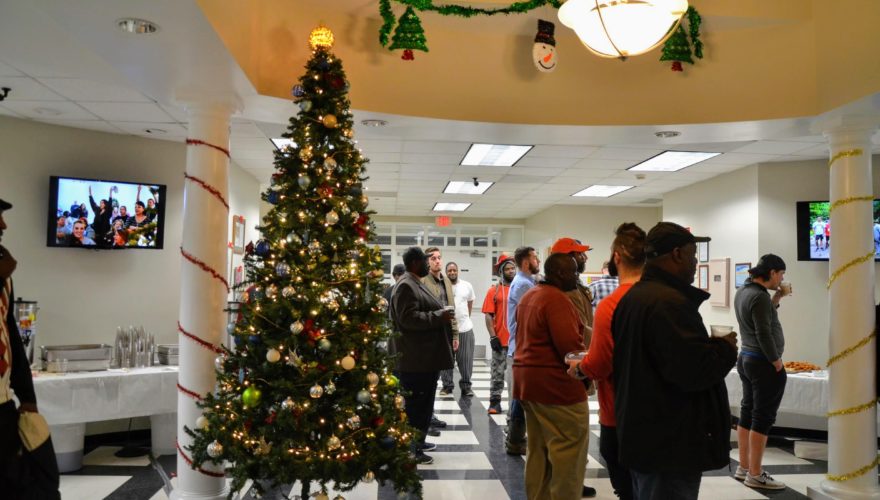December 24, 2018 By Taylor Knopf
Everyone knows holidays can be stressful. And if you’re in recovery from addiction, that just adds to the stress. Here are some ways to make your holidays – and those of folks you love – a little smoother.
 Terri Edwards’ first Christmas home after entering an addiction recovery program was “very uncomfortable.”
Terri Edwards’ first Christmas home after entering an addiction recovery program was “very uncomfortable.”
She had been away from her family for five years while she was using substances.
“I didn’t know exactly what my place was anymore because I had removed myself from the family unit for so long,” she said. “I was still trying to figure out who I was in recovery, and how I fit in with my family now.”
Edwards was a participant at Healing Transitions at the time, a program in Raleigh for people recovering from addiction. Nine years later, she works for the organization and is also a peer support specialist.
Looking back at those first few holidays back home, Edwards said it’s important for people in recovery to understand that everyone’s healing time is different.
“I may have started healing a little quicker because I had this wonderful program. But for them [the family], it may take a little more time,” she said. “I caused that damage, that hurt and that pain.
“My family was still angry with me the first couple years, and I had to allow them to feel that and not get mad.”
She tells other program participants that it’s important to plan a way out if you get overwhelmed or uncomfortable over the holidays.
Setting boundaries and expectations
Ann Marie Hoo, child and family resource specialist at Healing Transitions, echoed this saying it’s good for both the individual in recovery and their family members to set boundaries and set expectations for the holidays. And these things may need to be communicated ahead of time.
“A person newly in recovery needs to have an escape plan, meaning have a time limit in which you intend to stay,” Hoo said.
And she suggested setting these expectations up front by telling the family you need to leave at a certain time so you don’t seem rude.
“Have a back up if your family can’t bring you back: have a ride, have two to three people you can call if you’re feeling anxious or you feel like you want to drink to come get you immediately,” Hoo said
Going into an environment with alcohol or family members who were drinking or drugging buddies in the past is strongly discouraged, Hoo said. She suggests going to see mom or dad the day before the holiday event or the day after when it’s less likely you will run into people you’ve used with before.
“For the loved ones, I tell them, you have to live your life,” she said. But also prepare ahead of time.
Pennsylvania Public Media held a Twitter chat with experts and people in recovery this month called “Hope for the Holidays: Families, Opioids and Recovery.” The conversation can be found here.
She suggested that if the family usually has wine and beer with Christmas dinner, the host can ask the family member in recovery if they will feel uncomfortable with alcohol in the house. Maybe it would be best to have a dry holiday this year.
“And don’t ask questions that have to do with future plans. It’s uncomfortable to answer those questions at the holidays with lots of people,” Hoo said.
People in the first stages of recovery might not always want to talk about their treatment program or what they will do after. Let them bring it up if they want to, Hoo suggested. Instead, prepare safe questions to ask.
If you’re worried about your loved one in recovery using again in your home, Hoo said it’s OK to call someone in their network.
“Have a plan to say, ‘If you use in my house, this is what I’m going to do,’” Hoo said. “Let them be aware. Make sure they know what the rules are when they come in.”
Lock your meds
Always put medications in a lock box, whether there’s a family member in recovery or not, the counselors advised. There are a lot of people coming in and out of the home during the holidays.
For more information about locking away medications:https://www.lockyourmeds.org/
Justin Garrity, rapid response administrator at Healing Transitions, said that during his first holiday in recovery he still looked in his grandfather’s medicine cabinet, even after being sober for a year.
“It wasn’t until the second holiday that I didn’t look in that medicine cabinet,” he said. “That was a big deal for me.”
He joked that his parents still don’t quite know what to get him at Christmas now that he’s in recovery.
“My parents get my sister’s boyfriend a six-pack of beer, and they get me barbecue sauce because they don’t know what to get me,” he said.
Garrity’s family was especially cautious around him for the first couple of years. After almost five years, he says people drinking around him isn’t such a big deal.
“I don’t mind as much, and I’m not as fragile as I was in early recovery,” Garrity said.
Looking back, he said he wishes he could have explained to his family that he didn’t need to be treated as the black sheep of the family or be coddled.
“But I do appreciate that they did that. It shows a loving and caring family,” he said.
